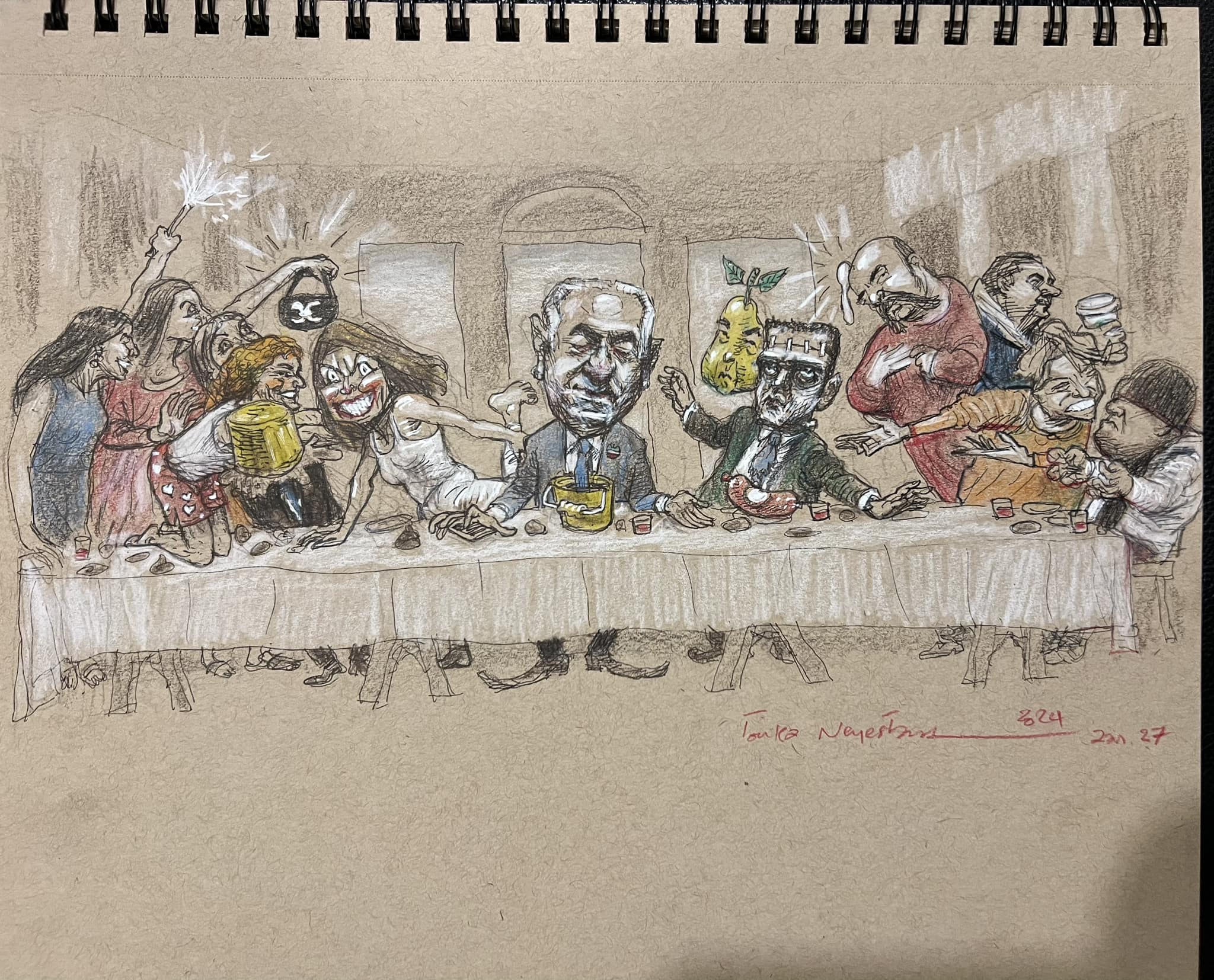The cartoon is from Touka Neyestani‘s Facebook page.
In the aftermath of Israel’s military strikes on Iran, a series of messages from Benjamin Netanyahu to the Iranian people predicting an “early freedom,” alongside escalating regional tensions and the victory of Donald Trump in the U.S. elections, has reinvigorated a dangerous delusion among parts of the Iranian opposition. Reza Pahlavi and ultra-monarchist factions, some of whom openly advocate for military intervention in Iran to seize power, are at the forefront of this trend.
Reza Pahlavi’s informal yet controversial meeting with Netanyahu last year, his frequent appearances at conferences hosted by far-right and religious extremists in Washington, the receipt of the “Architect of Peace” award from the Nixon Foundation, and his congratulatory messages to Trump expressing his desire to play a “historic role” in Iran all exemplify this renewed ambition.
This time, Pahlavi has abandoned any pretense of humility or ambiguity, declaring himself the self-appointed leader of a “transition period” at the supposed request of “you, the people.” This “request” remains vague and unsubstantiated, raising questions about who exactly has called for his leadership and under what circumstances. This claim not only reveals a new layer of authoritarianism in the so-called “Third Pahlavi” but also sidelines the principles of democracy, pluralism, and the decisive role of popular struggle—values that this faction claims to uphold.
The Illusion of Leadership in Transition
The self-proclaimed leadership of Pahlavi comes at a time when he and his advisors seem to have learned little from the failures of previous contenders for this role. The problem isn’t simply that the far-right in Iran lacks a viable leader; leadership is not conjured up by mere declarations.
Pahlavi’s advisors consist of amateur political enthusiasts—reactionary populists with sudden royalist leanings, devoid of meaningful political or revolutionary experience. Meanwhile, Pahlavi himself demonstrates little grasp of the fundamentals of politics. His inconsistent statements, constant reversals, repeated failures, and lack of stability and vision render him incapable of even organizing the monarchist factions, let alone leading Iran through a transitional period.
While it is true that widespread public discontent with the regime, coupled with nostalgic tendencies, ongoing governmental crises, Israel’s military aggression, and the lobbying efforts of radical right-wing factions abroad, have temporarily revitalized the monarchists, Pahlavi’s claim to leadership underscores the naivety of this movement. Their understanding of both domestic and international developments is profoundly shallow.
Misreading Iran and the Opposition
The monarchist faction lacks a clear picture of its social base, the broader opposition forces, or the feasibility of a return to monarchy in Iran. Neither do they understand the Islamic Republic’s mechanisms for maintaining power—such as backdoor deals with global powers, infiltration of opposition factions, or creating disillusionment to discredit the entire opposition.
This faction also fails to comprehend why their repeated calls for “grand protests” have been met with indifference inside Iran and have led to only small gatherings abroad. Despite Pahlavi’s limited social base within certain segments of Iranian society, this movement has demonstrated minimal organizational capacity and even less willingness to learn from past failures—whether it’s the failed National Council of Iranians, the Phoenix project, the so-called “New Covenant,” the “I Give Proxy” campaign, or the Mahsa Charter, which was arguably Pahlavi’s most serious political attempt.
Over the past two years, Reza Pahlavi and his supporters have faced sharp criticism for their attacks on critics, republicans, and especially leftists. These attacks have included character assassination and even threats of execution, aimed at silencing dissent. Pahlavi’s supporters have also used the Lion and Sun flag—a symbol many Iranians see as the national flag—as a tool to suppress protests abroad and to elevate their own position. This has drawn harsh criticism from other political groups, who argue that it presents an inaccurate portrayal of the desires of Iran’s nearly 85 million citizens.
With such a track record, their claim to lead a transition period only invites ridicule from the broader opposition.
Iran is No Place for Chalabism
What these factions fail to grasp is that Iran is not in 1979. The days when emotional appeals and declarations of leadership could compel people to surrender their agency are long gone. Experience, awareness, and pluralism are now deeply embedded in Iranian society, which instinctively rejects monopolistic leadership claims.
Additionally, the West, particularly the U.S., has grown wary of repeating the mistakes of Libya, Iraq, Afghanistan, and Syria. The idea of propping up a new Chalabi—a discredited figurehead manipulated by foreign powers—is no longer a tempting prospect. Even Trump, with his “maximum pressure” policy, quietly abandoned the dream of regime change. Reza Pahlavi’s backroom wanderings through think tanks and corridors of foreign power have brought nothing but further disgrace to his name.
There is no doubt that the Islamic Republic, as a historical aberration, will eventually come to an end. But this change will not come through reliance on foreign powers or gradual reform of the regime. It will be achieved through structural transformations driven by the social movements within Iran. These movements—not self-proclaimed leaders or external intervention—will be the true architects of the nation’s future.








